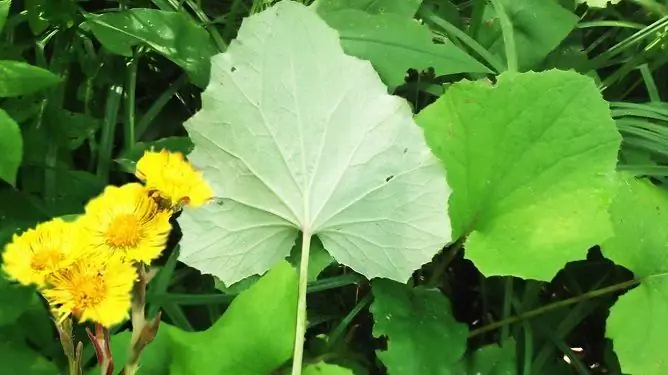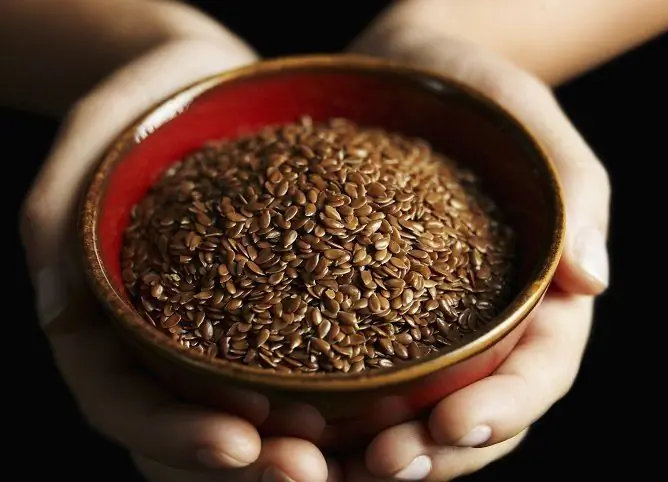- Author Rachel Wainwright wainwright@abchealthonline.com.
- Public 2023-12-15 07:39.
- Last modified 2025-11-02 20:14.
Herbs for coughs: expectorants at home
The content of the article:
- What herbs help with cough
- Herbal cough recipes for adults and children
- Video
Medicinal herbs for coughs are very effective, since they have anti-inflammatory, anti-infectious, expectorant effects, they are used for both dry and wet coughs.
Cough can occur in inflammatory diseases of the respiratory system (acute and chronic bronchitis), inhalation of chemicals, after smoking, due to aspiration of foreign bodies, allergies, as well as in some cardiovascular and gastrointestinal pathologies. Herbal medicine is a means of combating cough in inflammatory diseases of the respiratory tract. As a rule, it serves as an effective adjuvant, used as an adjunct to the main treatment.

Mother-and-stepmother has a pronounced expectorant effect
Folk remedies for cough from medicinal plants can be used during pregnancy, in children (phytotherapy drugs are prescribed for children from 3 years old, up to 2 years old remedies from medicinal plants are used with great care and only under the supervision of a doctor). In all cases, before using traditional medicine, you need to consult with a doctor, make sure they are used correctly and there are no contraindications, and in addition, the doctor will select the best remedy based on individual indications.
What herbs help with cough
The choice of medicinal plants for the treatment of cough depends on its type, accompanying symptoms, and the presence of contraindications. So, when coughing with viscous sputum, medicinal plants are used that help thin and remove mucus, and medicinal herbs that are used for dry coughs help soften the mucous membranes of the respiratory tract. If a patient suffers from a cough at night, he may be prescribed drugs with a sedative effect - fireweed, valerian, motherwort.
Mother and stepmother is a part of many cough preparations, as it has an antiseptic, anti-inflammatory and pronounced expectorant effect. Funds based on it contribute to the liquefaction of sputum, soften the mucous membrane of the respiratory tract, and therefore are widely used in tracheitis and bronchitis.
Plantain is an excellent expectorant herb for coughs; it is used for dry coughs with difficult to separate phlegm.
The most commonly used medicinal plants for diseases of the respiratory system include linden, which has anti-inflammatory, antiseptic, mucolytic effects. Linden color is prescribed for both dry and wet coughs.
Sage-based remedies help to get rid of not only cough, but also other symptoms that occur in diseases of the respiratory system.
Licorice helps to cleanse the respiratory tract of accumulated mucus, softens the mucous membranes of the respiratory tract. Licorice root rarely causes allergies, and therefore is included in the treatment of even the smallest patients.

Licorice root is an effective expectorant used in many pharmacy cough suppressants
Liquefaction and excretion of sputum is facilitated by marsh rosemary, which also softens the mucous membranes of the respiratory tract, has an antiseptic and anti-inflammatory effect. It is often prescribed for laryngitis, tracheitis, bronchitis, whooping cough.
Elecampane improves the excretion of phlegm from the respiratory tract, it helps with a wet cough. Ginger also contributes to the elimination of sputum from the respiratory tract, which also provides a general strengthening effect, and therefore is actively used for colds.
Peppermint has anti-inflammatory and soothing effects and helps to relieve dry coughs. It is often used in mixtures with other herbs and is effective for colds.
Often when coughing, thyme is used, which has anti-infective, anti-inflammatory, bronchodilatory, antispasmodic and mucolytic effects. Thyme has been shown to be effective in the treatment of whooping cough, bronchial asthma, bronchitis, and pneumonia.
Elderberry provides anti-inflammatory, antiseptic, expectorant effect. Elder flowers are used for coughing.
Marshmallow root promotes the regeneration of damaged tissues, is prescribed for tracheitis, laryngitis, whooping cough.
Pansies have a mucolytic, expectorant effect. Effective against cough in tracheitis, bronchitis, bronchopneumonia, whooping cough.
Parmelia (Icelandic moss, honey grass, cut grass), which is often used to treat coughs of infectious etiology, has an antiseptic, expectorant, sedative effect. Parmelia-based remedies are used for bronchitis, pneumonia, tuberculosis and other diseases of the respiratory system.
Herbal cough recipes for adults and children
From medicinal herbs, tinctures, infusions, decoctions, solutions for inhalation, medicinal lozenges are prepared. The easiest to prepare are infusions and decoctions (they can also be used as solutions for inhalation). Plants can be used both individually and as part of herbal cough preparations.
The simplest way to prepare an infusion of medicinal herbs is to pour boiling water over them, followed by cooling, after which the liquid is filtered from the grass. You can also brew herbs in a thermos, in this case, the infusion time increases - in some cases it is necessary for better extraction of medicinal substances. Chopped medicinal plants should be brewed. The infusion can be prepared in any suitable container (teapot, French press, etc.), preferably made of glass or ceramic. A small metal or ceramic ladle-shaped saucepan is best for the broth.

Parmelia, or Icelandic moss, provides not only expectorant but also antibacterial effect
Infusion of licorice root, lungwort leaves, fennel fruits, coltsfoot, tricolor violet, plantain. All plants are mixed in equal amounts, 2 tablespoons of the resulting mixture are placed in a thermos, 500 ml of boiling water is poured and left for 4 hours. Drink ½ glass 2 times a day.
Take chamomile, coltsfoot, anise seeds, peppermint, plantain leaves in equal amounts. The infusion is prepared in the same way as the previous one (2 tablespoons of herbs per 500 ml of boiling water). Take ½ glass 2 times a day for a month, after that you need to take a break for 2 weeks, if necessary, the course of treatment can be repeated.
A decoction of coltsfoot, linden, thyme, chamomile, eucalyptus and sage. Place in a suitable container 1 tablespoon of each plant, add 1 liter of water and boil over low heat for 3 minutes. After that, the broth is allowed to cool, filtered, and 1 glass is taken throughout the day.
Steam inhalations are carried out 1-2 times a day, the duration of the procedure depends on the age of the patient and the substance or mixture used for the procedure. Adult patients are recommended to inhale for 10-15 minutes, children over 5 years old are shown shorter inhalations (in the treatment of children under 5 years old, not steam, but nebulizer inhalation is used). Also, steam inhalation is contraindicated at elevated temperatures. It is recommended to start these procedures as soon as a cough occurs, so they work more effectively. For inhalation when coughing, eucalyptus, chamomile, coltsfoot, thyme, sage, oregano, calendula, pine buds are often used.
Cough drops can be made at home from herbal ingredients and sugar.

Cough drops are easy to make at home
Lollipops based on hibiscus tea are good for cough and sore throat. To prepare them, 1 tablespoon of hibiscus flowers need to be poured with 1 cup of boiling water, a little grated ginger root, a pinch of mint, anise, turmeric and leave for 30-40 minutes. After that, filter the infusion, add 1.5 cups of brown sugar, cook until thickened over medium heat, stirring constantly. After that, the mixture is removed from the heat, honey, lemon juice are added and poured into candy molds or on parchment paper. When the candies have set, sprinkle them with powdered sugar and transfer them to a suitable storage container.
Herbal cough drops are prepared as follows: 1/4 cup of a mixture of sage, elderberry, and wild cherry bark is poured with a glass of water, brought to a boil and cooked over low heat for 20 minutes. If it is not possible to get the indicated plant materials, it can be replaced with a ready-made breast collection, one of those that are sold without a prescription in any pharmacy (for example, breast collection 4).
Strain the finished broth, add 2 cups of granulated sugar, 2 tablespoons of honey and cook over low heat, stirring constantly, until the mixture begins to thicken, after which it is poured onto baking paper or into candy tins. It is advisable to store ready-made lollipops in a glass or tin container.
Video
We offer for viewing a video on the topic of the article.

Anna Aksenova Medical journalist About the author
Education: 2004-2007 "First Kiev Medical College" specialty "Laboratory Diagnostics".
Found a mistake in the text? Select it and press Ctrl + Enter.






